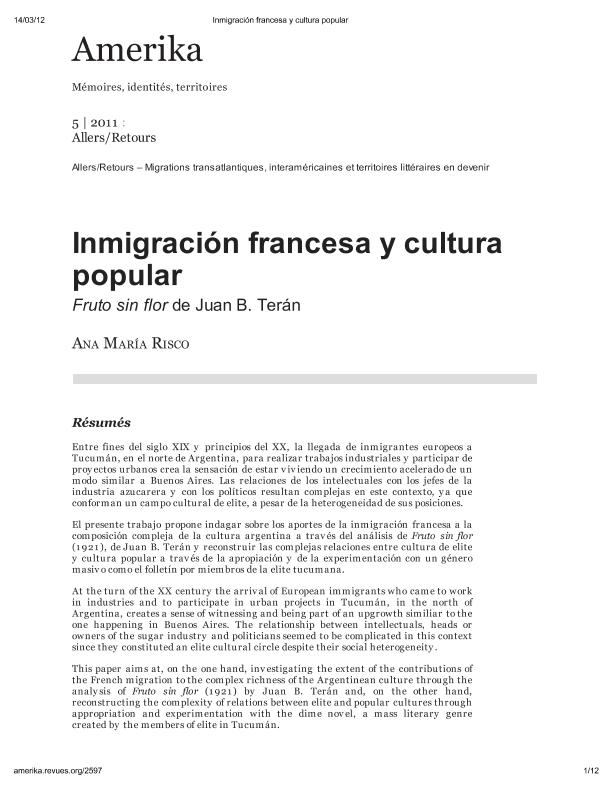Artículo
Entre fines del siglo XIX y principios del XX, la llegada de inmigrantes europeos a Tucumán, en el norte de Argentina, para realizar trabajos industriales y participar de proyectos urbanos crea la sensación de estar viviendo un crecimiento acelerado de un modo similar a Buenos Aires. Las relaciones de los intelectuales con los jefes de la industria azucarera y con los políticos resultan complejas en este contexto, ya que conforman un campo cultural de elite, a pesar de la heterogeneidad de sus posiciones. El presente trabajo propone indagar sobre los aportes de la inmigración francesa a la composición compleja de la cultura argentina a través del análisis de Fruto sin flor (1921), de Juan B. Terán y reconstruir las complejas relaciones entre cultura de elite y cultura popular a través de la apropiación y de la experimentación con un género masivo como el folletín por miembros de la elite tucumana. At the turn of the XX century the arrival of European immigrants who came to work in industries and to participate in urban projects in Tucumán, in the north of Argentina, creates a sense of witnessing and being part of an upgrowth similiar to the one happening in Buenos Aires. The relationship between intellectuals, heads or owners of the sugar industry and politicians seemed to be complicated in this context since they constituted an elite cultural circle despite their social heterogeneity. This paper aims at, on the one hand, investigating the extent of the contributions of the French migration to the complex richness of the Argentinean culture through the analysis of Fruto sin flor (1921) by Juan B. Terán and, on the other hand, reconstructing the complexity of relations between elite and popular cultures through appropriation and experimentation with the dime novel, a mass literary genre created by the members of elite in Tucumán.
Inmigración francesa y cultura popular
Título:
French migration and popular culture
Fecha de publicación:
12/2011
Editorial:
Université de Rennes. Laboratoire de Recherches Interdisciplinaires sur les Amériques
Revista:
Amerika
ISSN:
2107-0806
Idioma:
Español
Tipo de recurso:
Artículo publicado
Clasificación temática:
Resumen
Archivos asociados
Licencia
Identificadores
Colecciones
Articulos(CCT - NOA SUR)
Articulos de CTRO.CIENTIFICO TECNOL.CONICET - NOA SUR
Articulos de CTRO.CIENTIFICO TECNOL.CONICET - NOA SUR
Citación
Risco, Ana Maria; Inmigración francesa y cultura popular; Université de Rennes. Laboratoire de Recherches Interdisciplinaires sur les Amériques; Amerika; 5; 12-2011; 1-12
Compartir
Altmétricas




